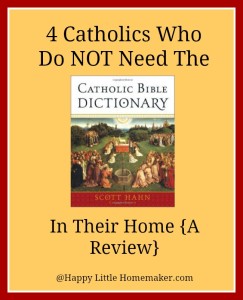Disclaimer: I received a copy of this book in exchange for an honest review. This post contains affiliate links. Thanks for your support!

So I finally finished my last book through Blogging For Books about The Church and I saw this veritable tome in the queue–Catholic Bible Dictionary by Scott Hahn. Um, yes please! And I got it in the mail and then spent 2 weeks wondering what to do with it :).
A beautiful book, the Catholic Bible Dictionary is about 2 inches thick. It is, well, a reference book. This isn’t a book you curl up on the couch with…unless you bring a tv tray over for some serious bible study. The inside is very well designed with plenty of white space and regular sized print. No magnifying glass needed!
Inside you will find all manner of topics. People, places, events and even historical context all in alphabetical order. When more can be found in another entry, you are directed to it, similar to an encyclopedia. I’ve found descriptions of items frequently mentioned in the bible but rarely seen/heard of today, people mentioned sideways, and more. One thing that it seems to be missing is more visuals. There are a handful of maps, but that’s it. A few more images and visuals would be helpful. Whenever I’m wondering about something (or my kids ask a question I can’t answer), I reach for this first.
That being said, here are 4 Catholics who do NOT need the Catholic Bible Dictionary in their home.
1. Catholics who are biblical scholars.
There are over 2000 years of people way smarter than me who have studied the bible & everything in it, in light of Catholic Tradition. Since I am just a busy mom trying to teach my small kids about God, there are things I don’t know — and they are quickly learning more than I know. The Catholic Bible Dictionary is helping me to stay one step ahead.
2. Catholics who have a lot of time.
If you have a ton of time to research rabbit trails, then you don’t really need the Catholic Bible Dictionary. I love this book because I can look up historical information and other things quickly.
For instance, we’ve been studying the plagues of Egypt and I was flipping through to find the plagues and got sidetracked by the historical information on the exodus itself and book of Exodus. Could you imagine the number of hours I could have spent following rabbit trails via Google!?!
3. Catholics who have copious amounts of space.
If you have a lot of space to store the Navarre Study Bibles, old concordances and other books about Catholicism, the Bible & biblical history, you probably don’t need this book.
While I have always wished for my own home library (think the library in Beauty & the Beast), I just don’t have room to store all the books I’d love to have on every subject. My to-read shelf is already obscene. The Catholic Bible Dictionary is great because it has a ton of historical and contextual information in one spot. It is great for a beginning-intermediate bible study student. From a Catholic POV. Honestly, it’s the only one I’ve ever seen for Catholics.
4. Catholics who have a plethora of money.
If you have the money to buy all the books mentioned above or (even better) take classes on biblical history, you probably don’t need this book, either.
While the Catholic Bible Dictionary is not the cheapest book I own, it is not the most expensive either. But it’s close. It’s proving to be a good resource for saving my time (see #2 above) and money since I’m not buying other (non-Catholic) resources to find out more and then having to find out how closely what is said by a particular Protestant resembles Catholic understanding of a topic.
So, if you are a Catholic biblical scholar, or have extra time, money or space, the Catholic Bible Dictionary is probably unnecessary. If, however, you are just a normal Catholic wanting to know more, this is a great place to start. I’m really excited to have added this book to my home!
What resources do you use to learn more about your Catholic faith?

